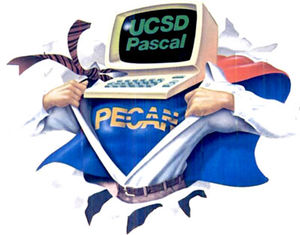Pecan UCSD Pascal: Difference between revisions
mNo edit summary |
|||
| (11 intermediate revisions by 2 users not shown) | |||
| Line 1: | Line 1: | ||
[[Image:Pecanucsd.jpg|thumb|Logo]] | |||
[[Image:Pecanucsd.jpg| | A 16-bit [[Pascal]] development system that compromised an editor, p-code interpreter and native compiler for OS/2 and DOS. | ||
A 16 bit [[Pascal]] development system that compromised an editor, p-code interpreter and native compiler for OS/2 and DOS | |||
==History== | |||
Pecan Software Systems, Inc. had acquired the Softech Microsystems catalogue in 1985 from Network Consulting Inc. and with them a license to the [[UCSD Pascal]] compiler and p-code runtime for the IBM PC. In 1986 Pecan released them for a number of systems and added a number of guest languages for the p-code system, initially [[FORTRAN]] and [[Basic]]. Later [[C]] and [[Modula 2]] were also made available (the M2 compiler based on the old Volition Systems compiler). But most notably they lowered the price to USD 79.95, which was more in line with [[Turbo Pascal]] than what traditional peddlers of UCSD Pascal systems which usually charged five to ten times that amount. | |||
The system could run both as a self booting UCSD p-code operating system and as a Pascal development system hosted on DOS or OS/2. The system ended up with UK operation ''Cabot Software'' who increased the compatibility with Turbo/Borland Pascal and developed the [[Cabot UCSD Pascal]] for 32-bit OS/2. | |||
==Links== | ==Links== | ||
* [ | * [https://archive.org/details/bitsavers_volitionSy20.3jIBMPC_14753891 Volition Systems Modula-2 Manual] - Handbook for the compiler that became the Modula-2 part of Pecan's UCSD Pascal | ||
* Joel Pitt: [//books.google.com/books?id=1y8EAAAAMBAJ&pg=PA55 Volition Systems' Modula-2 programming language] - InfoWorld Vol.5 No.38 (Sep 1983) | |||
[[Category:Pascal]] | |||
Latest revision as of 19:50, 3 February 2023

A 16-bit Pascal development system that compromised an editor, p-code interpreter and native compiler for OS/2 and DOS.
History
Pecan Software Systems, Inc. had acquired the Softech Microsystems catalogue in 1985 from Network Consulting Inc. and with them a license to the UCSD Pascal compiler and p-code runtime for the IBM PC. In 1986 Pecan released them for a number of systems and added a number of guest languages for the p-code system, initially FORTRAN and Basic. Later C and Modula 2 were also made available (the M2 compiler based on the old Volition Systems compiler). But most notably they lowered the price to USD 79.95, which was more in line with Turbo Pascal than what traditional peddlers of UCSD Pascal systems which usually charged five to ten times that amount.
The system could run both as a self booting UCSD p-code operating system and as a Pascal development system hosted on DOS or OS/2. The system ended up with UK operation Cabot Software who increased the compatibility with Turbo/Borland Pascal and developed the Cabot UCSD Pascal for 32-bit OS/2.
Links
- Volition Systems Modula-2 Manual - Handbook for the compiler that became the Modula-2 part of Pecan's UCSD Pascal
- Joel Pitt: Volition Systems' Modula-2 programming language - InfoWorld Vol.5 No.38 (Sep 1983)